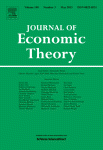A theory of robust experiments for choice under uncertainty
Thought experiments are commonly used in the theory of behavior in the presence of risk and uncertainty to test the plausibility of proposed axiomatic postulates. The prototypical examples of the former are the Allais experiments and of the latter are the Ellsberg experiments. Although the lotteries from the former have objectively specified probabilities, the participants in both kinds of experiments may be susceptible to small deviations in their subjective beliefs. These may result from a variety of factors that are difficult to check in an experimental setting: including deviations in the understanding and trust regarding the experiment, its instructions and its method. Intuitively, an experiment is robust if it is tolerant to small deviations in subjective beliefs in models that are in an appropriate way close to the analyst’s model. The contribution of this paper lies in the formalization of these ideas.

